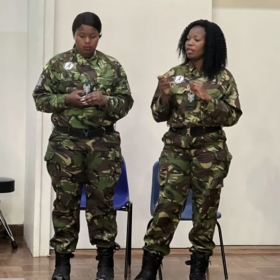Black Mamba Sergeants Visits SPCS
Published on isbi School News dated Thursday 19th of October 2023
We were honoured that two Black Mamba sergeants and their UK charity representative visited us on Wednesday. The Mambas were in London to collect an award from the Scientific Exploration Society for scientific endeavour and inspirational leadership, and they stopped by to tell Years 4 to 6 all about the important conservation work they do in South Africa.
The Black Mamba Anti-Poaching Unit (APU) is the first predominantly all-female anti-poaching unit in South Africa. The unarmed teams operate within Balule Nature Reserve, a protected wildlife area spanning nearly 100,000 acres and part of the Greater Kruger National Park. Kruger is home to the largest population of rhino in the world, and also is victim to more poaching attacks than any other area.
The thirty-six sergeants have gained the trust and support of their peers, are village role models and family breadwinners. Bush meat poaching has dropped by 90% and they have served as early detection, disruption and prevention of rhino poaching in their patrol areas. The Black Mambas have developed a community centre and work in 10 primary schools in their villages. 1,300 young children are part of their education and upliftment program.
The Park is fenceless to aid movement of animals throughout the landscape, with some exceptions designed to keep animals from crossing highways, and more importantly, keep poachers and bushmeat hunters out. Each month, every Black Mamba spends 21 days straight patrolling Balule by foot or jeep—four hours at dawn and four hours at dusk—in search of snares, human tracks, sounds of gunshots, and other suspicious activity. They call in backup, or trained special forces, to seize troublemakers. It’s risky—not only are there armed poachers, the women are policing areas where lions, elephant, buffalo and leopard roam free.
What the Mambas lack in weapons, they make up in skill, teamwork, and gumption. The three months of required training for entry include physical exercise—running around three miles daily, and classroom work, such as learning surveillance practices, compliance techniques, and how to use walkie-talkies. The last month is the most rigorous, focusing on survival tactics in the bush, including building shelter and functioning without food or water.
Sergeants Belinda and Cute told the children that while it's a dangerous job, the work of the Mambas is invaluable—providing hope for a better future while fulfilling many of the women’s passion for wildlife and rhino conservation.



